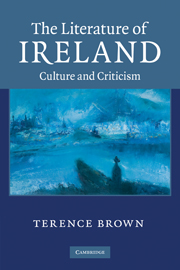Book contents
- Frontmatter
- Contents
- Acknowledgements
- Introduction
- 1 The Literary Revival: historical perspectives
- 2 Joyce's magic lantern
- 3 Music: the cultural issue
- 4 Modernism and revolution: rereading Yeats's ‘Easter 1916’
- 5 Shakespeare and the Irish self
- 6 Irish literature and the Great War
- 7 Ireland, Modernism and the 1930s
- 8 Post-modernists: Samuel Beckett and Flann O'Brien
- 9 Patrick Kavanagh: religious poet
- 10 MacNeice's Irelands: MacNeice's islands
- 11 Louis MacNeice and the Second World War
- 12 MacNeice and the puritan tradition
- 13 John Hewitt and memory: a reflection
- 14 Michael Longley and the Irish poetic tradition
- 15 Seamus Heaney: the witnessing eye and the speaking tongue
- 16 Derek Mahon: the poet and painting
- 17 Telling tales: Kennelly's Cromwell and Muldoon's ‘The More a Man Has the More a Man Wants’
- 18 Redeeming the time: John McGahern and John Banville
- 19 ‘Have we a context?’: transition, self and society in the theatre of Brian Friel
- 20 Hubert Butler and nationalism
- 21 The Irish Dylan Thomas: versions and influences
- Index
- References
15 - Seamus Heaney: the witnessing eye and the speaking tongue
Published online by Cambridge University Press: 05 June 2012
- Frontmatter
- Contents
- Acknowledgements
- Introduction
- 1 The Literary Revival: historical perspectives
- 2 Joyce's magic lantern
- 3 Music: the cultural issue
- 4 Modernism and revolution: rereading Yeats's ‘Easter 1916’
- 5 Shakespeare and the Irish self
- 6 Irish literature and the Great War
- 7 Ireland, Modernism and the 1930s
- 8 Post-modernists: Samuel Beckett and Flann O'Brien
- 9 Patrick Kavanagh: religious poet
- 10 MacNeice's Irelands: MacNeice's islands
- 11 Louis MacNeice and the Second World War
- 12 MacNeice and the puritan tradition
- 13 John Hewitt and memory: a reflection
- 14 Michael Longley and the Irish poetic tradition
- 15 Seamus Heaney: the witnessing eye and the speaking tongue
- 16 Derek Mahon: the poet and painting
- 17 Telling tales: Kennelly's Cromwell and Muldoon's ‘The More a Man Has the More a Man Wants’
- 18 Redeeming the time: John McGahern and John Banville
- 19 ‘Have we a context?’: transition, self and society in the theatre of Brian Friel
- 20 Hubert Butler and nationalism
- 21 The Irish Dylan Thomas: versions and influences
- Index
- References
Summary
From the start Seamus Heaney has seemed oddly guilty about being a poet at all. Indeed, one of his earliest widely admired poems, ‘Digging’, scarcely disguised its embarrassment at the inadequacy of a poetic career in comparison with Heaney's father's more obviously useful skills. The association in that poem, the first in Death of a Naturalist (1966) and therefore standing at the head of Heaney's oeuvre, of the pen with gun seems a rather desperate stratagem to invest the poet's art with something of the male authority of the father's spade and the ancestral achievement it consolidates. ‘Real men don't write poems’ is the emotional undercurrent of the piece. So it is not until ‘Funeral Rites’ in North, as the poet steps in to accept a communal role at the funeral of ‘dead relations’, that he can assert, ‘I shouldered a kind of manhood.’ The implication is that it is only in such an act of social involvement that the poet can begin to feel truly adequate as a man.
This sense of the questionable worth of a poetic career, which in its simplest form may involve a doubt as to whether the writing of lyric poems is any work for a man, frequently finds expression in Heaney's poetry and criticism as an interrogation of the ethical efficacy of the poetic act itself. For Heaney has always been a poet anxious to do the world some good, troubled by his art's apparent incapacity to make things happen.
- Type
- Chapter
- Information
- The Literature of IrelandCulture and Criticism, pp. 190 - 198Publisher: Cambridge University PressPrint publication year: 2010



